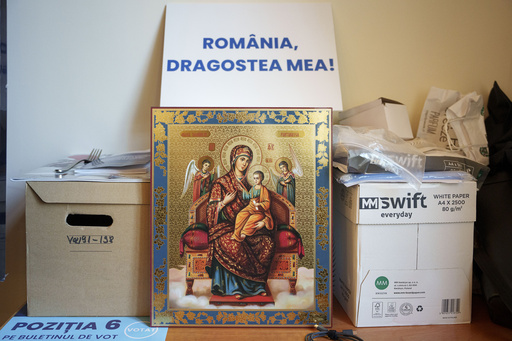
BUCHAREST, Romania — At the headquarters of his far-right nationalist party in the capital, George Simion expressed his support for Donald Trump’s reelection just days before launching his own campaign for Romania’s presidency. He dismissed claims suggesting he is a Russian agent, stating his desire for Romanians to see their leaders as proactive rule-makers rather than passive rule-takers.
The leader of the Alliance for the Unity of Romanians (AUR), formed in 2019, emphasized the party’s core principles which include family, nation, faith, and freedom during a press conference in Bucharest. The 38-year-old candidate faces significant barriers, having been barred from entering Moldova and Ukraine due to security concerns, yet he firmly rejected any allegations of links with Russian intelligence.
The upcoming presidential election, set for Sunday, will feature 13 candidates, with expectations of a runoff on December 8, where Simion may compete against Prime Minister Marcel Ciolacu, who is endorsed by Romania’s largest party, the Social Democratic Party (PSD). Concurrently, parliamentary elections will be held on December 1, effectively deciding Romania’s future government and prime minister. The elected president will serve a five-year term, holding substantial authority over national security and foreign policy matters.
Ciolacu articulated his vision for a more developed Romania that prioritizes inclusiveness through economic growth and investment, while improving its international standing. He criticized extremist leaders, asserting that they should be politically marginalized and excluded from governmental discussions.
In addition to Ciolacu and Simion, notable candidates include Elena Lasconi from the Save Romania Union, independent runner Mircea Geoana (former NATO deputy secretary-general), and Nicolae Ciuca, a past army general affiliated with the center-right National Liberal Party, which currently shares a delicate coalition with PSD.
Political analyst Claudiu Tufis noted the unpredictable nature of polling data leading up to the election, citing potential biases aimed at swaying outcomes. He remarked that the contest is likely to narrow down to a fierce battle between Simion and Lasconi, influenced largely by voter turnout domestically and abroad.
Simion has long been a controversial figure, advocating for the reunification of Moldova, a country that recently imposed a five-year entry ban on him. His party surged from obscurity to capturing 9% of votes in the 2020 parliamentary elections, gaining them a foothold in parliament. Critics label Simion and AUR as extremist, particularly highlighting past controversies, such as their opposition to Holocaust education mandates in Romania, which they branded as a trivial matter. The party also stands against same-sex marriage and has established strong connections with the Romanian Orthodox Church.
While condemning Russian President Vladimir Putin as a “war criminal” and criticizing Western sanctions for being insufficient, Simion voiced opposition to Romania sending additional military aid to Ukraine, a nation currently receiving support, including Patriot missile systems, from Romania.
Simion expressed hopes that Trump’s potential reelection could enhance his own standing, as he has openly praised Trump’s disruptive style. Following the full-scale Russian invasion of Ukraine in 2022, Romania has played an integral role within NATO, establishing a training center for F-16 pilots from allied nations, including Ukraine.
Geoana, with extensive international experience, claims this sets him apart from his rivals. He argued that the Romanian political landscape has fallen behind the needs of its society and stressed Romania’s strategic relevance on the global stage.
Lasconi, a former journalist now heading the USR, aims to shed Romania’s negative image as corrupt and impoverished, promising to advocate for the country’s full entry into the Schengen Area, which allows unrestricted travel across many European nations. She identified corruption as the primary challenge plaguing state institutions and revealed her commitment to enhancing defense spending and supporting Ukraine’s victory in the ongoing conflict with Russia.
Reflecting public sentiment, Eugen Ionescu, a local restaurant owner, indicated his reluctance to vote but felt compelled to favor the “lesser evil” in the impending elections. He fears that Simion’s victory could dismantle the fragile stability Romania currently enjoys.
